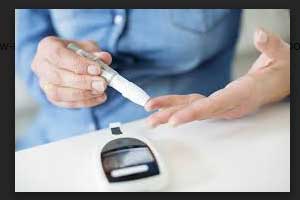- Home
- Editorial
- News
- Practice Guidelines
- Anesthesiology Guidelines
- Cancer Guidelines
- Cardiac Sciences Guidelines
- Critical Care Guidelines
- Dentistry Guidelines
- Dermatology Guidelines
- Diabetes and Endo Guidelines
- Diagnostics Guidelines
- ENT Guidelines
- Featured Practice Guidelines
- Gastroenterology Guidelines
- Geriatrics Guidelines
- Medicine Guidelines
- Nephrology Guidelines
- Neurosciences Guidelines
- Obs and Gynae Guidelines
- Ophthalmology Guidelines
- Orthopaedics Guidelines
- Paediatrics Guidelines
- Psychiatry Guidelines
- Pulmonology Guidelines
- Radiology Guidelines
- Surgery Guidelines
- Urology Guidelines
Poor blood sugar control raises stroke and death risk in Type 2 diabetes, finds new study

Sweden: Poor blood sugar control in patients with type 2 diabetes (T2D) increases the risk of stroke and death, according to a recent study published in the journal Diabetes, Obesity and Metabolism.
Patients with diabetes are known to be at increased risk of cardiovascular (CV) complications including a high prevalence of atherosclerotic diseases, such as myocardial infarction and stroke. In general, people with diabetes are 1.5 times more likely to have a stroke than people without diabetes.
Risk factors of stroke include hypertension, atrial fibrillation, smoking, carotid stenosis and hyperlipidemia that contribute to the increased risk. In diabetic patients, hyperglycemia (high blood sugar) can also lead to increased stroke risk. In addition to hyperglycemia, other coexisting CV risk factors are observed in T2D patients in conjunction with metabolic syndrome (obesity, hypertension, hyperlipidemia and insulin resistance) can further contribute to increased stroke risk.
Thomas Nystrom, Karolinska Institutet, Stockholm, Sweden, and colleagues compared stroke incidence between patients with type 2 diabetes and a matched control group and investigated whether glucose exposure in T2D patients can predict first‐time stroke event and mortality.
The study included 406,271 patients with T2D (64.1±12.4 years/women 45.7%) and 2,008,640 control subjects (64.0±12.4 years/women 45.7%). Nationwide observational cohort study patients with T2D were linked in the Swedish National Diabetes Register and matched with five individual population‐based control subjects.
Key findings of the study include:
- During a median follow-up of 7.3 years, 26,380 (6.5%) patients with T2D vs. 92,372 (4.4%) of control subjects were diagnosed with a stroke.
- The incidence rate was 10.88 events per 1,000 person-years vs. 7.03 events per 1,000 person-years.
- In patients with T2D and after multivariable adjustments for stroke with HbA1c (mmol/mol) levels, 54-64, 65-75, 76-86 and >87 mmol/mol, respectively, compared with the reference category of HbA1c ≤53 mmol/mol.
- There was a stepwise increased risk of death for every 10 mmol/mol categorical increment of HbA1c for the highest HbA1c category.
Also Read: Simple Blood test can detect stroke risk in diabetes patients
"During the long-term follow-up period in patients with T2D with poor glycaemic control, the risks of stroke and death were almost twice that of patients with T2D with good HbA1c control, i.e., 53 mmol/mol (7%). Hyperglycaemia is a modifiable risk factor for stroke; therefore, the achievement of good glycaemic control should be strived for to minimise this complication," wrote the authors.
Source:
Risk of first stroke in patients with type 2 diabetes and the relation to glycaemic control: a nationwide observational study
DOI: https://doi.org/10.1111/dom.13885

Disclaimer: This site is primarily intended for healthcare professionals. Any content/information on this website does not replace the advice of medical and/or health professionals and should not be construed as medical/diagnostic advice/endorsement or prescription. Use of this site is subject to our terms of use, privacy policy, advertisement policy. © 2020 Minerva Medical Treatment Pvt Ltd